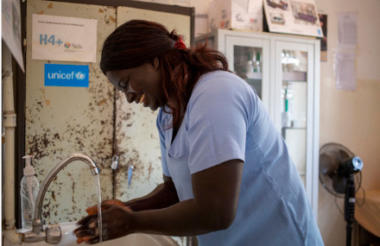It’s hard to imagine now, but just a few months ago, at the start of the year, when I was announced as the new executive director of Unicef UK, we had very little idea what coronavirus was and that it would create the need for the largest emergency response in Unicef 's 73-year history.
Fast forward to 14 April, and here I am joining one of the largest humanitarian charities for children around the world, mid global pandemic with hundreds of UK based employees looking to me for leadership and guidance in a time of global crisis.
Unicef was founded in 1946 to support children after the devastation of the world wars at the start of the last century. It’s an organisation that has always been close to my heart because in the years that followed its creation, Unicef helped my own parents by providing them with vaccines and milk during and after partition in their home country of India.
Nearly 75 years later, Unicef is still here, helping children in more than 190 countries around the world.
Biggest emergency since World War II
The coronavirus pandemic is undoubtedly the biggest crisis affecting children globally since the Second World War. An additional 6,000 children around the world could die every day from preventable causes over the next six months as the pandemic weakens health systems and disrupts routine services like vaccinations.
To join a global family that has stepped up in such a powerful way to support vulnerable children at this crucial time is such a privilege.
This month, we launched our largest ever appeal Save Generation Covid, which is raising vital funds for lifesaving support and services to ensure that children survive this crisis – and thrive beyond it.
Through this appeal, we will tackle coronavirus globally for the sake of children and their families – by supplying vital medical equipment, working with communities, supporting health, education and social services for children, tackling misinformation and carrying out prevention campaigns.
Colleagues from Unicef offices around the world have spoken to me about the value of the UK’s commitment and I’m immensely proud to be a part of it. The British public are extremely generous, even when they’re facing challenges of their own, and as a result we can deliver significant levels of fundraising at a time when Unicef around the world needs it more than ever.
It’s not just the public we’re appealing to. We’ve been speaking with the UK government – along with global partners and donors – to encourage investment in health systems in poorer countries. The UK government has already contributed generously to Unicef’s global appeal for coronavirus and shown strong leadership on global health by investing in GAVI – now to save children’s lives it is critical to invest in building sustainable and strong primary health care while protecting the delivery of essential services.
'Difficult decisions to make'
The coronavirus has also presented some significant challenges for me personally since joining Unicef UK.
We have temporarily had to vacate our office in Stratford and as a result have all had to learn to work remotely and communicate virtually, which is especially difficult when I’m yet to meet many of my colleagues in person.
It’s frustrating that I haven’t yet been able to meet people in the way that I would have hoped. However, I’m hugely appreciative of how dedicated colleagues have been in continuing to deliver, even when juggling significant demands at home.
Another significant challenge I’ve faced since joining Unicef UK is the overall environment in which we are trying to deliver our plans for the year. The crisis and lockdown has, in many cases, made important activities on which we were depending for fundraising simply impossible. And in almost every other case how we deliver has been significantly disrupted.
Like many charities, we’ve had to put our face-to-face fundraising activity on hold for social distancing reasons. And we’ve also had to make the difficult decision to postpone our flagship fundraising event, Soccer Aid for Unicef, until later in the year.
These were difficult decisions to make, but I am confident it was the best course of action to protect our frontline staff as well as our generous supporters.
Refocusing communication
Unicef UK’s business model is thankfully relatively stable and we are supported by a broad group of individuals and organisations from right around the country, but even then to overcome these challenges we have swiftly refocused a large part of our public communications so people can understand just how important Unicef is in the response to this global crisis.
It’s right that coronavirus is now central in our communications because the pandemic is creating such devastating impacts for vulnerable children and so is something our supporters feel passionately about.
That is why we have launched our Save Generation Covid campaign, it represents our duty to communicate the scale of the challenge coronavirus poses around the world and why, even when we face challenges at home, the rest of the world cannot be ignored.
2020 is clearly a tougher year in which to deliver than any of us could have expected. We are going to need to continue to work with agility and courage in the months ahead, but I’ve no doubt with the committed team I am part of we will achieve great things to support children in the UK and around the world.












